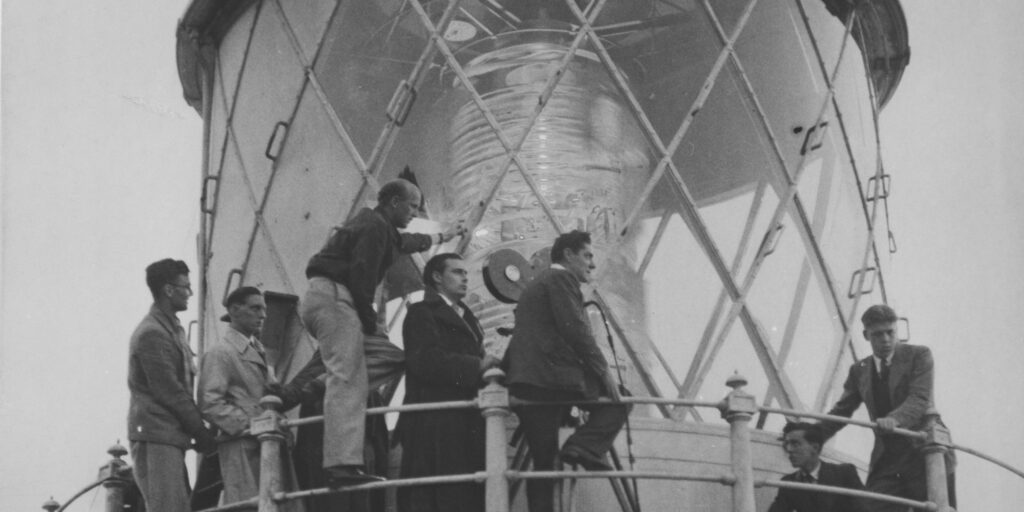CUTTING THROUGH THE FOGBELT: A TASTE OF POWELL BEFORE PRESSBURGER

Curated by James Bell in collaboration with Thelma Schoonmaker and Ian Christie
Michael Powell used to complain wryly that his reputation couldn’t survive the discovery of any more films from before he met Emeric Pressburger. Only 6 of the 23 films he made between 1931-1936 were available to show in the BFI’s major 1978 retrospective that began a revaluation of these then-neglected filmmakers. Today, it’s clear that Powell needn’t have worried, for as more films have been discovered, they shed valuable light, not only on an ambitious young director’s education, but also on the decade when British cinema was being reconstructed.
The springboard was Britain’s new film legislation, which coincided with the arrival of sound at the end of the 1920s. Other European countries had been forced to protect national production, as American studios dominated their markets after World War One. In Britain’s case, the bar was set dangerously low, requiring a bare minimum to qualify as “Quota”, which gave rise to the scandal of mediocre “quota quickies”, made and distributed only to support American features’ continuing dominance.
But these also created an academy for aspiring young filmmakers such as Powell, newly returned from the South of France to a foggy England still gripped by the Depression. At the Victorine studio near Nice, Powell had enjoyed an extraordinary apprenticeship with Rex Ingram, an early Hollywood legend now based in Europe. Back in England, he had to create his own luck, joining forces with a young American independent, Jerry Jackson, who soon secured backing from the long-established Gaumont-British company.
Powell began to find his feet, learning how to work with actors, such as the comedian Jerry Verno, star of two of his earliest surviving films, Hotel Splendide and His Lordship, who would reappear in The Red Shoes; the authoritative Leslie Banks, and other fledgling talents, such as Googie Withers and John Laurie. Another crucial encounter was with the German émigré Alfred Junge, later to design many of the greatest Powell-Pressburger collaborations. Immigrants and visitors were breathing new life into English production of the 1930s, and it was an American maverick, Joe Rock, who enabled Powell to make The Edge of the World, which brought him to the attention of the cosmopolitan Alexander Korda.
Korda would not only team two beginners in his stable, but gave Powell a taste of working in colour and on a grand scale with The Thief of Bagdad. But before we reach the Archers’ masterpieces, there is much to savour in Powell’s handling of often mundane material in this selection, which alongside archive 35mm prints, premieres four new remasters from the BFI’s project to restore all 13 extant films from Powell’s ‘prentice years.
Ian Christie and James Bell
Program
Saturday 24/06/2023
18:45
Cinema Lumiere - Sala Scorsese
RIVIERA REVELS/HOTEL SPLENDIDE
RIVIERA REVELS/HOTEL SPLENDIDE
James Bell (BFI), Ian Christie and Thelma Schoonmaker
Daniele Furlati (Riviera Revels)
Sunday 25/06/2023
12:00
Auditorium DAMSLab
CINEMA LESSON | MICHAEL POWELL
CINEMA LESSON | MICHAEL POWELL
Sunday 25/06/2023
18:45
Cinema Lumiere - Sala Scorsese
HIS LORDSHIP
HIS LORDSHIP
Monday 26/06/2023
18:30
Cinema Lumiere - Sala Scorsese
RED ENSIGN
RED ENSIGN
Ian Christie
Monday 26/06/2023
21:30
Cinema Lumiere - Sala Scorsese
THE EDGE OF THE WORLD
THE EDGE OF THE WORLD
Ian Christie
Tuesday 27/06/2023
18:30
Cinema Lumiere - Sala Scorsese
THE PHANTOM LIGHT
THE PHANTOM LIGHT
Wednesday 28/06/2023
18:15
Cinema Lumiere - Sala Scorsese
THE LOVE TEST
THE LOVE TEST
James Bell (BFI)
Wednesday 28/06/2023
21:45
Piazza Maggiore
BLACK NARCISSUS
BLACK NARCISSUS
Friday 30/06/2023
18:45
Cinema Lumiere - Sala Scorsese
HER LAST AFFAIRE
HER LAST AFFAIRE
Saturday 01/07/2023
18:15
Cinema Lumiere - Sala Scorsese
THE EDGE OF THE WORLD


